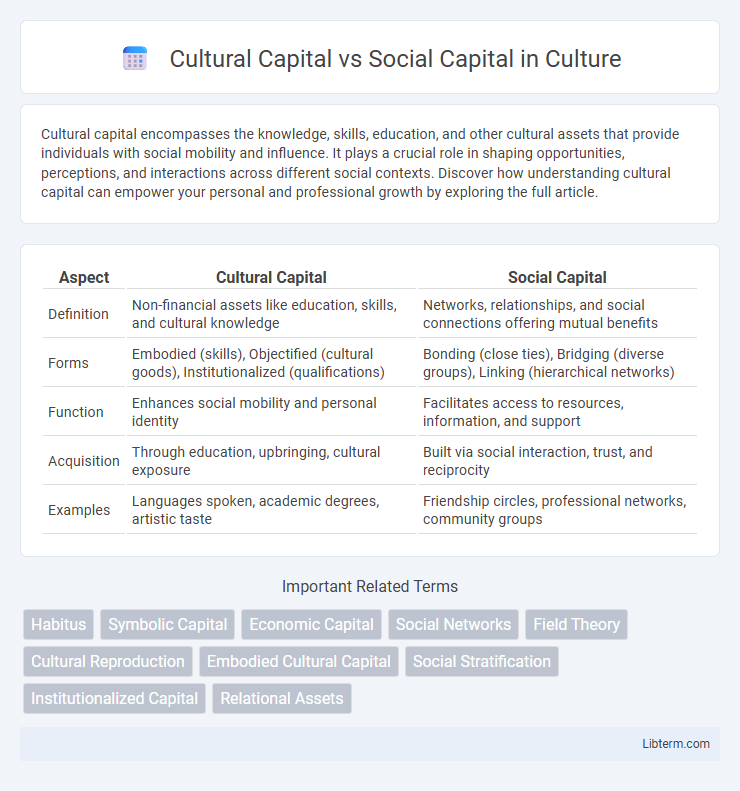Cultural capital encompasses the knowledge, skills, education, and other cultural assets that provide individuals with social mobility and influence. It plays a crucial role in shaping opportunities, perceptions, and interactions across different social contexts. Discover how understanding cultural capital can empower your personal and professional growth by exploring the full article.
Table of Comparison
| Aspect | Cultural Capital | Social Capital |
|---|---|---|
| Definition | Non-financial assets like education, skills, and cultural knowledge | Networks, relationships, and social connections offering mutual benefits |
| Forms | Embodied (skills), Objectified (cultural goods), Institutionalized (qualifications) | Bonding (close ties), Bridging (diverse groups), Linking (hierarchical networks) |
| Function | Enhances social mobility and personal identity | Facilitates access to resources, information, and support |
| Acquisition | Through education, upbringing, cultural exposure | Built via social interaction, trust, and reciprocity |
| Examples | Languages spoken, academic degrees, artistic taste | Friendship circles, professional networks, community groups |
Introduction to Cultural and Social Capital
Cultural capital consists of non-financial social assets such as education, intellect, style of speech, dress, or physical appearance that promote social mobility beyond economic means. Social capital refers to the networks of relationships and social connections that provide individuals with collective benefits and access to resources. Both forms of capital play crucial roles in shaping opportunities, influencing social outcomes, and affecting individuals' power within society.
Defining Cultural Capital
Cultural capital refers to the non-financial social assets that enable social mobility, such as education, intellect, style of speech, dress, or physical appearance. It encompasses knowledge, skills, and cultural awareness acquired through upbringing and education, which individuals use to gain advantage in society. Unlike social capital, which is based on relationships and networks, cultural capital emphasizes the value embedded in cultural knowledge and practices.
Defining Social Capital
Social capital refers to the networks, relationships, and social connections that enable individuals and groups to access resources, support, and opportunities within a community. It encompasses trust, reciprocity, and shared norms that facilitate cooperation and collective action. Unlike cultural capital, which involves knowledge, skills, and education, social capital emphasizes the value derived from social interactions and communal bonds.
Historical Origins of Both Concepts
Cultural capital, a concept introduced by sociologist Pierre Bourdieu in the 1970s, refers to non-financial social assets such as education, intellect, style of speech, and appearance that promote social mobility. In contrast, social capital, popularized by scholars like James Coleman and Robert Putnam, focuses on the value derived from social networks, trust, and norms facilitating cooperation within or among groups. The historical origins of cultural capital are rooted in critical sociology and theories of social stratification, while social capital emerged from studies in sociology and political science exploring community cohesion and institutional trust.
Key Differences Between Cultural and Social Capital
Cultural capital refers to non-financial social assets such as education, intellect, style of speech, and dress that promote social mobility and influence within a society. Social capital, on the other hand, encompasses the networks, relationships, and social connections that facilitate cooperation and access to resources or support. Key differences lie in cultural capital's emphasis on individual attributes and knowledge, whereas social capital focuses on collective relationships and the benefits derived from them.
How Cultural Capital Influences Social Mobility
Cultural capital, encompassing education, skills, and cultural knowledge, significantly shapes social mobility by providing individuals with the tools and credentials valued in society and the labor market. Possession of high cultural capital often leads to better job opportunities, higher income, and enhanced social status, thereby facilitating upward social movement. In contrast, social capital, which refers to networks and relationships, amplifies these effects by connecting individuals to resources and opportunities otherwise inaccessible.
The Role of Social Capital in Community Building
Social capital plays a crucial role in community building by fostering trust, cooperation, and shared values among members, which enhances collective action and social cohesion. It manifests through networks, norms, and social relationships that enable individuals to work together effectively for mutual benefit and community development. High levels of social capital correlate with improved public health, economic growth, and stronger democratic governance in diverse communities.
Interplay and Overlap Between Cultural and Social Capital
Cultural capital and social capital often intertwine, as cultural knowledge and skills enhance one's social networks and facilitate access to valuable resources. For example, shared cultural norms and values strengthen social ties, creating trust and reciprocity within communities. This interplay underscores how cultural capital can amplify social capital by fostering meaningful connections and collaborative opportunities.
Impact on Education and Economic Opportunities
Cultural capital, such as educational credentials, language proficiency, and familiarity with dominant cultural norms, directly enhances academic performance and access to prestigious institutions, thereby increasing economic opportunities. Social capital, represented by networks, relationships, and social connections, facilitates resource sharing, job referrals, and mentorship, significantly influencing career advancement and wealth accumulation. Both forms of capital interplay to determine educational success and economic mobility, with cultural capital shaping individual competencies and social capital providing structural support.
Future Perspectives on Capital in Society
Future perspectives on cultural capital emphasize its evolving role in digital literacy and global cultural exchange, reshaping identity and social mobility in knowledge-based economies. Social capital continues to gain importance through online networks and community engagement, driving collaborative innovation and resilience in increasingly interconnected societies. Integrating both forms of capital is crucial for addressing social inequalities and fostering inclusive growth in future socioeconomic frameworks.
Cultural Capital Infographic

 libterm.com
libterm.com